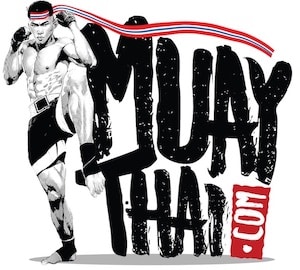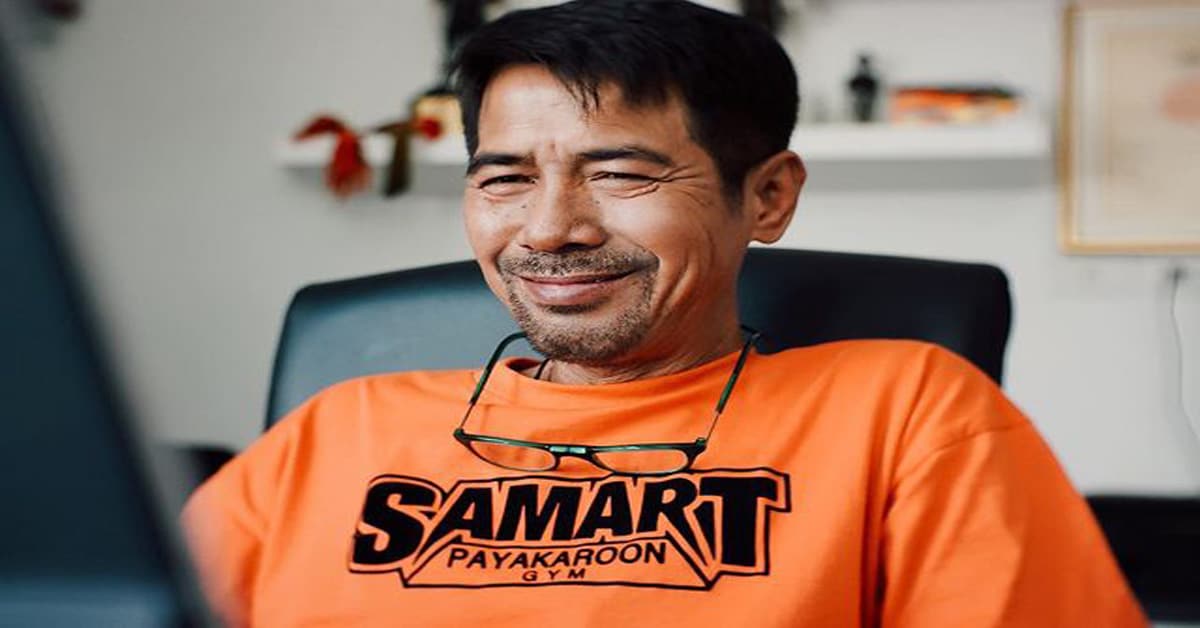Samart Payakaroon: Jade Faced Tiger The Muay Thai Legend
Samart Payakaroon, also known as the “Jade Faced Tiger” is widely considered to be the greatest Muay Thai fighter of all time. He made his professional debut at the age of 10 and quickly rose through the ranks, winning his first stadium title at the age of 17. Between 1980 to 1981, “Jade Faced Tiger,” was able to capture four weight class championships in the iconic Lumpinee Stadium. A nearly impossible task across all combat sport. This Thai-born athlete retired with a record of 150-19-2.
Samart Payakaroon was the embodiment of technical brilliance in combat sports. This Thai athlete dazzled stadium goers with his lightning-quick reflexes and impeccable timing. As a Nak Muay, Samart’s arsenal of devastating techniques included his signature teep kicks, deployed with such finesse that they effectively kept his opponents at distance. However, his skill set extended beyond defensive maneuvers. Samart’s ability to expertly cut angles in the ring transformed him into an elusive target. This frustrated adversaries who struggled to land clean strikes. His agile footwork and elusive movements made him a formidable force to reckon with, showcasing the artistry of Muay Thai in every precise and dynamic exchange.
Samart is a national hero in Thailand and is revered by fans of Muay Thai around the world. He is often compared to Muhammad Ali and Sugar Ray Robinson, two of the greatest boxers of all time. But Samart was more than just a great fighter. He was also a charismatic and popular figure, known for his flamboyant personality and his showmanship in the ring. He was also a successful actor and singer in Thailand, which helped to increase the visibility of Muay Thai in the country.
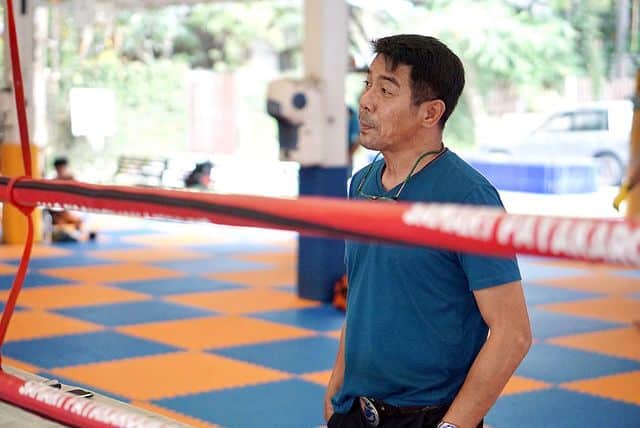
Who is Samart Payakaroon?
| Name: | Samart Payakaroon or Samart Tiptarmai |
| Thai Name: | สามารถ พยัคฆ์อรุณ |
| Date of Birth: | December, 5 1962 |
| Place of Birth: | Chacherngsao, Thailand |
| Nickname: | “Baby Face Tiger” or “Jade Faced Tiger” |
| Gym: | Songchai Rattanasuban |
| Height: | 172 cm (5 ft 8 in) |
| Weight: | 126 lb (57 kg; 9 st 0 lb) |
| Weight Classes: | Flyweight, Super Bantamweight, Featherweight |
| Record(s): | Muay Thai 130-18-2 – Boxing 21-2-0 |
| Years Active: | 1972-1993 |
| Championships: | Four Muay Thai World Championships, One Boxing World Title |
Samart Payakaroon Early Life
Samart Payakaroon was born on December 5, 1962, in Buriram, Thailand. He grew up in a family deeply involved in Muay Thai, which played a significant role in shaping his career in combat sports.
Samart’s father, Petch Payakaroon, was a well-known Muay Thai fighter and trainer. From a young age, Samart was exposed to the world of Muay Thai and received training and guidance from his father. Under his father’s tutelage, Samart developed a passion for the sport and began honing his skills.
Samart’s journey in Muay Thai began when he started training at his family’s gym in Buriram. He demonstrated exceptional talent and quickly gained recognition for his skills and natural abilities in the ring. His father recognized his potential and dedicated himself to nurturing Samart’s talents, providing him with rigorous training and guidance.
As Samart progressed in his training, he began competing in amateur Muay Thai fights and achieved significant success. He displayed remarkable speed, technique, and ring intelligence, which set him apart from his peers. Samart’s early accomplishments further fueled his passion for the sport and solidified his decision to pursue a career in Muay Thai.
Samart Payakaroon followed a demanding and disciplined training schedule to excel in Muay Thai. His daily routine began with an early morning run, covering several miles to enhance his endurance and stamina. Shadow boxing sessions allowed him to simulate fights, working on combinations, footwork, and defensive techniques to improve his coordination, timing, and technique. Pad work with trainers and sparring partners formed a significant part of his training, focusing on striking accuracy, power, and defensive maneuvers.
Controlled sparring sessions helped him refine his reactions, adaptability, and offensive strategies. Conditioning exercises, including skipping rope, weight training, and bodyweight exercises, were incorporated to develop strength, agility, and explosive power.
Specific training sessions were dedicated to clinching and grappling techniques, such as Muay Thai sweeps, throws, and knee strikes. Samart also emphasized technique refinement through repetitive Muay Thai drills and meticulous attention to detail.
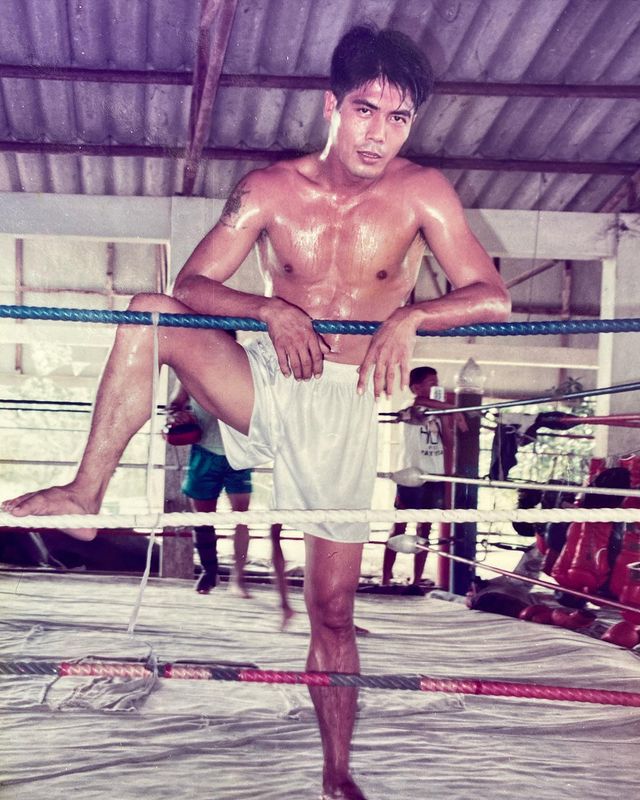
Samart’s World Titles in Combat Sports
While competing during the golden era of Muay Thai, with his precise and dangerous skills Samart was able to capture several prestigious Muay Thai World Titles. Additionally, the Thai-born athlete was able to capture a boxing world championship during his career. Here’s a lit of Samart’s major world titles in combat sports:
- 1980 Lumpinee Stadium 102 lbs World Champion
- 1980 Lumpinee Stadium 105 lbs World Champion
- 1981 Lumpinee Stadium 115 lbs World Champion
- 1981 Lumpinee Stadium 126 lbs World Champion
- World Boxing Council (WBC) World Super Bantamweight Champion
What Samart Payakaroon Notable in Muay Thai History?
Samart Payakaroon, regarded as one of the greatest Muay Thai fighters of all time, showcased his skills by defeating numerous notable opponents throughout his career. Among the most noteworthy fighters he conquered were Dieselnoi Chor Thanasukarn, renowned for his dominant clinch work, and Pongsaklek Wonjongkam, a former WBC flyweight champion in boxing.
The Thai-born athlete also triumphed over Luangpor Pongsawang, a formidable opponent known for his powerful punches, and Namkabuan Nongkeepahuyut, a highly respected and skilled Muay Thai fighter. Another memorable victory came against Samransak Muanglek, showcasing Samart’s ability to overcome tough challenges and emerge victorious. These triumphs solidified Samart Payakaroon’s position as an elite fighter and established his legacy as one of the most iconic figures in the world of combat sports.
The Nak Muay was able to gain renown for transitioning and trying his skills in international professional boxing. Samart Payakaroon’s boxing career was a significant chapter in his extraordinary athletic journey. Despite already achieving immense success in Muay Thai, Samart ventured into the realm of professional boxing and made a lasting impact on the sport. His boxing career holds great significance for several reasons. In 1986, Samart won the WBC Super Bantamweight title.
Samart’s boxing prowess was characterized by his exceptional technical skills. He seamlessly integrated elements from his Muay Thai background, employing devastating punches, swift footwork, and adept defensive maneuvers. His style showcased a masterful understanding of distance, timing, and precision.
Beyond his fighting career, Samart Payakaroon expanded his presence in the entertainment world through acting. He starred in several Thai movies and TV dramas, showcasing his versatility as a performer. His on-screen charisma, coupled with his athletic background, helped him garner a wide fan base beyond the realm of combat sports.
Samart’s success in fighting and acting propelled him to unprecedented levels of popularity in Thailand. His charm, talent, and positive public image made him a sought-after figure for endorsements and brand sponsorships. Samart appeared in commercials and promotional campaigns for various products and companies, further solidifying his celebrity status.
As a major celebrity, Samart Payakaroon exerted a significant cultural influence on Thai society. He served as an inspiration for aspiring fighters and athletes. Samart Payakaroon engaged in philanthropic endeavors. He used his platform to raise awareness and support charitable causes, particularly those related to youth development, sports, and education.
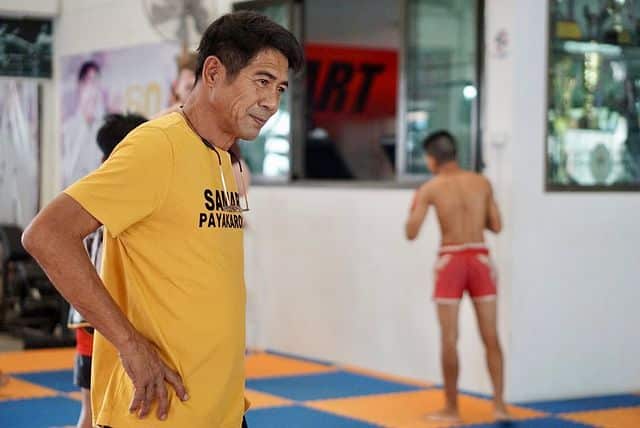
Samart Payakaroon on the Current State of Muay Thai
Over the past decade, Samart has been vocally critical of the current state of Muay Thai. In interviews, the Nak Muay legend has outlined that it has declined from being a source of national pride to just another sport.
He criticizes the current scoring system in Thailand, which he believes is causing fans to lose interest. The Thai icon questions the judges’ decisions, observing instances where a boxer seemingly winning three rounds can suddenly lose in the fourth round, causing confusion among fighters, fans, and himself.
Samart laments the disappearance of the old boxers and fans who used to appreciate the artistry of Muay Thai, leaving only gamblers as the main audience. The Muay Thai athlete believes that the current scoring system favors strength and betting odds rather than technical skills and the full range of techniques.
He expresses worry about the decline in purses and attendance at Thai stadiums, attributing it to the control of promoters and the fading interest of some Thai people in their own cultural heritage. Samart predicts that in the future, Muay Thai may be controlled overseas, as a foreign passion for the sport and culture surpasses that of some Thai people. Keep in mind that he was saying this in 2011.
Samart Payakaroon, the “Jade Faced Tiger,” a legendary Muay Thai fighter, has left an indelible mark on combat sports history. With his technical prowess, lightning-quick reflexes, and showmanship, he rose to become the greatest Muay Thai fighter of all time.
Samart’s accomplishments, including capturing four weight class championships in Stadium Muay Thai and winning a boxing world title, highlight his exceptional skill and versatility in the ring. He not only dominated the world of combat sports but also became a national hero and a revered figure in Thailand. His legacy as an icon of the sport and his advocacy for its preservation continues to inspire future generations of fighters. Samart Payakaroon’s impact on Muay Thai is an enduring testament to his unparalleled talent, charisma, and dedication to the art form.
